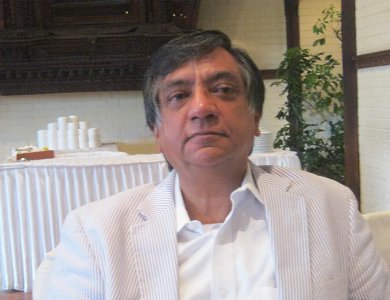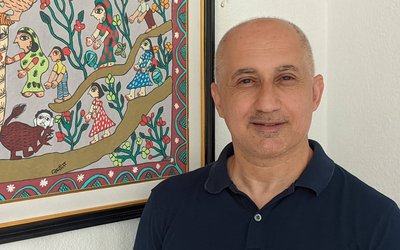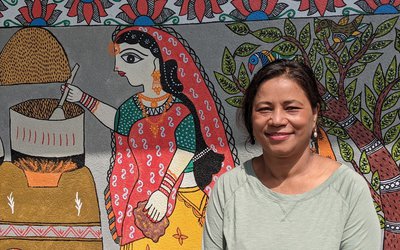
After completion of the two day regional consultation, Wasim Zaman, Executive Director of International Council on Management and Population (ICOMP), spoke to NEW SPOTLIGHT on various issues related to population management. Excerpts:
How do you see the outcome of the conference?
The presence from high level political level leaders, parliamentarians, civil society leaders of all eight South Asian Countries was very important. We have had senior ministers from four countries, parliamentarians from almost all South Asian countries, civil society leaders and academicians, all of whom had been there throughout the meeting contributing to all the sessions. They contributed thoroughly on what needs to be done in South Asia, the action in the areas of reproductive health and family planning particularly focusing on young people, marginalized and poor with less income.
Do you think all the issues came up?
All the close issues came up in a big way. There were also repeated discussions about how South Asian urbanization should have regional forum for organization that can take that issue forward for South Asia.
How did participants view the role of SAARC?
The role of SAARC was discussed. It was felt that the SAARC needs to be much more engaged, much more effective in the areas of health, population and development. It was also recommended in the call of action that SAARC should be strengthened to take up these specific task and that SAARC should engage as these areas as a priority. In addition to that there were issues that came up about the collaboration between the South Asian countries.
What lessons have been learnt?
It was felt that all countries have their own lessons that can be learnt and shared by others. We always talk about South-South collaboration but South- South should not be a vague concept that we should have collaboration between South Asian countries. We can learn from each other and very specific examples are given in the Plan of Action.
Did they raise the question of collaboration in the region?
The other issue that came up in a very big way is the issue of government –civil society or NGOs collaboration. Let us say governments and civil society are partners. It would be hard to address some of these difficult problems that have been lingering. It was felt that there should be more understanding between government and NGOs. There is a committee for population and development in the UN. The meeting of that committee will take place in April of 2014 and finally the United Nations Special General Assembly on Population and Development will take place in September 2014. It was felt by the ministers, parliamentarians and civil society leaders who attended this meeting that presence of civil society delegates in the official delegation is absolutely crucial. The partnership is bonded and seen and it should be taken forth.
Why was this consultation important?
As part of this process, the 6th Asian and Pacific Population Conference (APPC) will be convened by the UN Economic and Social Commission for Asia Pacific, in cooperation with UNFPA from 16-20 September 2013 in Bangkok. The Conference will serve as an intergovernmental platform for the Asia-Pacific preparations for the special session of the General Assembly on the International Conference on Population and Development Beyond 2014. Therefore, the on-going SAARC level regional consultation here in Kathmandu will prepare substantive ground for the SAARC countries in assisting them with dialogue and reflection, and synthesize and articulate the achievements, gaps, missing-links and lessons gathered under the Population Programs since 1994.
You also mentioned the gap of fund in the region. How do you look at it?
The call for action has a specific call there. They have noted concerns that the fund for Asia most specifically for South Asia has decreased. The participants also expressed their concerns that South Asia is not getting the attention it should from international organizations like UNFPA, foundations and other bilateral donors. South Asia is not getting enough money and the kind of attention it deserves. It was also observed in the meeting that we also have no problems that makes Africa get the attention, and that is very important. But we have problems with the issues as South Asia is in the group that has the largest population in the world. If the South Asian concerns are not taken into account viz-a-vie providing matching amount of fund necessary to deal with these issues not provided by multilateral organizations and civil society organizations and NGOs are not involved by them, then we see there will be problem.
What is the major objective of the meeting?
One of the aims of the consultative meeting was to provide a platform for dialogue amongst parliamentarians and civil society leaders in South Asia to identify the remaining gaps, and challenges as well as lessons learned since the implementation of the 1994 ICPD plan of action. The consultative meetings, among others, also helped to assist in the preparation of a road map to position sexual and reproductive health and rights including family planning at the core of development agenda in South Asia beyond 2014. The meeting also stressed the need to promote the use of data and evidences in operational review process as well as in policy making program design and implementation for collective actions on post-ICPD beyond 2014 initiatives towards full achievement of ICPD goals and MDG.
- TANAHU HYDROPOWER PROEJCT: A Significant Achievement
- Apr 15, 2024
- AMBASSADOR HANAN GODAR: Sharing Pain With A Nepali Family
- Mar 30, 2024
- VISIT OF KfW AND EIB TO NEPAL : Mission Matters
- Mar 25, 2024
- NEPAL BRITAIN SOCIETY: Pratima Pande's Leadership
- Mar 24, 2024
- NEPAL ARMY DAY: Time To Recall Glory
- Mar 15, 2024
















